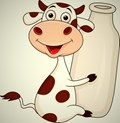
As milk is loaded with nutrients, it can help you start a power-packed day. Also, it is rich in protein which is an essential breakfast element. Along with milk, you can add other healthy elements with it like – muesli, oats, dry fruits, etc.
Jasleen Kaur, a dietician, and nutritionist say – “The importance of milk we learn from the day we are born, as a child stays on the mother's milk for months and that's food for the baby. Milk is packed with amazing benefits, 28% calcium, 24% vitamin D. Milk is an excellent source of vitamins and minerals and we all enjoy milk. Consuming milk at breakfast is very important and healthy and we can also add almonds and walnuts to it. Adding oats or muesli with milk is healthy for people suffering from cholesterol issues."
Better bone health: A good source of calcium, milk is extremely beneficial for bone health. It helps in building healthy and strong bones. It is important to give milk to your children on a daily basis to ensure the better development of bones and teeth. Regular consumption of milk can reduce the risk of osteoporosis
Source of good protein: Besides calcium, milk is also a good source of protein as well. Just one cup of milk is a source of 8 grams of protein. The abundant amount of protein in milk can help in repairing muscles and promote muscle health.
Good source of vitamin B12: In animal products, Vitamin B12 is largely present. So, it becomes difficult for vegetarians to find the right source of vitamin B12. Thankfully, milk is a healthy and easy source of vitamin B12. You can add milk to your diet to avoid the deficiency of vitamin B12.
Loaded with nutrients: Milk is a powerhouse of nutrients. It contains – calcium, good fats, vitamin D, vitamin B12, potassium, phosphorus, and many more. You should add milk to your daily diet and follow it as a healthy practice.
Exceptionally, people suffering from lactose intolerance cannot drink milk, but there are other non-dairy options like – almond milk, coconut milk, rice milk, soy milk, cashew milk, oat milk.

















